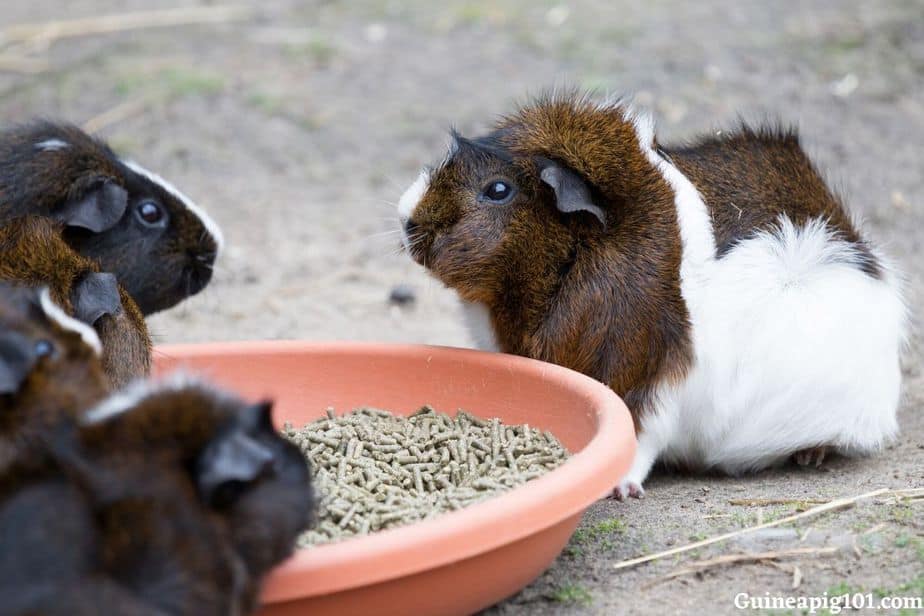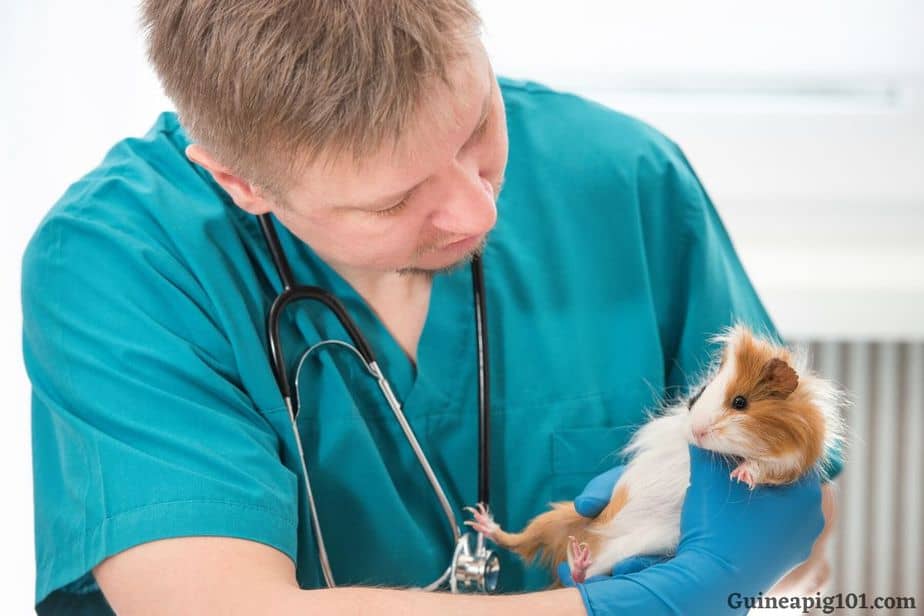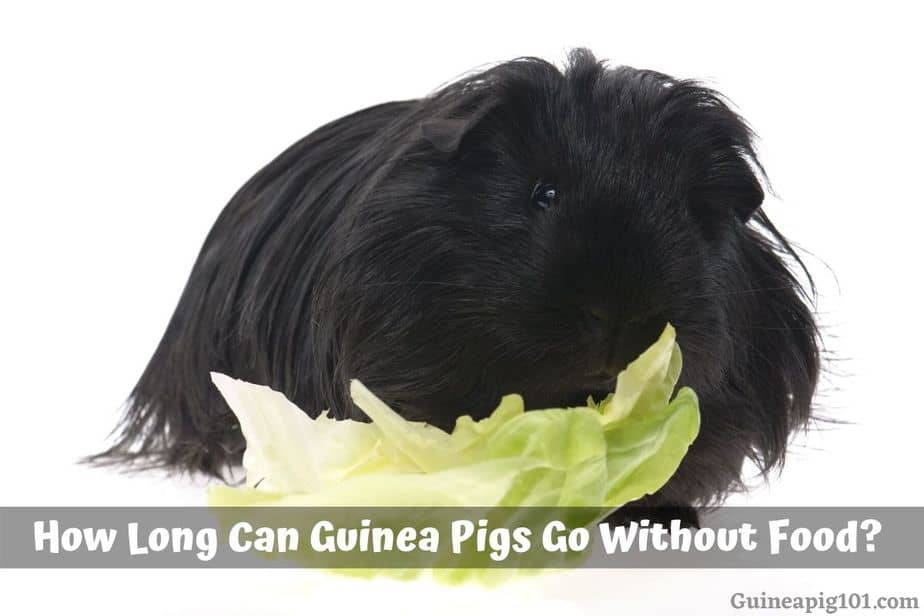Food is an essential requirement for all living beings. You need to ensure your guinea pigs eat a well-balanced diet. But sometimes guinea pigs refuse to eat the food. Other times they might run out of food when you are away. So, it is crucial to know how long can guinea pigs go without food?
So, I decided to go ahead and do some research, and here is what I have learned.
Guinea pigs should not be without food for more than 6-8 hours. If your guinea pig is deprived of food for more than 24 hours, it can lead to intestinal blockage. A constant supply of hay is crucial for them. Vegetables and pellets can be skipped for 24-48 hours, considering they have plenty of hay.
Guinea pigs are herbivorous animals. Their diet should include pellets, timothy hay, vegetables, fruits, etc. While hay is the staple part of their diet, vegetables, fruits, and pellets also play a vital role.
They also need food rich in Vitamin C as they cannot prepare vitamin C themselves. They cherish having treats.
Although guinea pigs are fond of eating different food, they do not overeat unless offered with their favorite treats. If you find that guinea pig is leaving food in the bowl every day, you might be giving excess food.
How much hay do guinea pigs need a day?

An average guinea pig can eat 90-100 grams of timothy hay in a day.
Hay is an integral part of the diet for guinea pigs. They should be provided with hay all through the day. Almost 80% of the food should be hay.
Hay grass helps them indigestion, as is it rich in fiber. Hay grass also helps to keep the teeth in good shape.
Guinea pigs have ever-growing teeth, and chewing hay grass helps to grind the teeth down and keep it in shape.
Guinea pigs show allergies to some particular type of hay. You must watch out for the same.
Hay grass having too high calcium and protein should be avoided. Stones are formed by serving calcium-rich hay grass. The best hay grass for a guinea pig is timothy hay.
Hay grass having a high content of calcium and protein is required by young growing or pregnant guinea pigs. Alfalfa contains calcium, which can be provided along with other hay grass.
How long can guinea pigs go without hay?
Guinea pigs need a regular supply of fresh hay. A guinea pig that doesn’t get to eat hay for the first 6-12 hours will start experiencing digestive problems.
The next 12 hours(12-24 hours) will be difficult as their intestine stops working and processing food. They are likely to pass away within 24-48 hours without hay.
Hay provides our guinea pigs with fiber that is crucial to keep their digestion process going. As they don’t get enough hay, their digestive system will start malfunctioning. It can also lead to blockage of their intestines, leading to GI stasis.
If your guinea pig doesn’t get enough hay, their digestive process is weakened, which triggers numerous other diseases.
Although timothy hay is not the primary source of nutrition, it helps digestion and fulfills dietary requirements.
If the guinea pig does not have hay, their teeth are likely to get overgrown. That leads to multiple problems like the struggle to eat, discharge from eyes, stress, dental problems, etc.
How much vegetables do guinea pigs need a day?

Vegetables are also an essential part of the diet of guinea pigs. Guinea pigs should be provided with one cup or 120-150 grams of vegetables.
They should be served a mix of various veggies to create a well-balanced diet.
Leafy green vegetables should be fed at least once a day, along with 2-4 other vegetables.
Make sure you create a mix of low calcium vegetables with high calcium ones to create a well-balanced diet.
Leafy vegetables should include lettuce, kale, cilantro, spinach, chards, etc. followed by other veggies.
Vegetables rich in Vitamin C like red and green pepper, broccoli, and tomatoes are good options. Other vegetables like carrot, cucumber, zucchini, etc. can be offered occasionally.
How long can guinea pigs go without veggies
Guinea pigs can survive for a few days without vegetables. Although vegetables are crucial for meeting their vitamin needs if you cannot serve them vegetables for a few days, replace them with pellets for a small period.
Guinea pigs cannot prepare Vitamin C. They need the right quantities of Vitamin C and other nutrients from their food to remain healthy. Green vegetables fulfill the requirements of vitamin C and other vital nutrients.
Vitamin C deficiency in guinea pigs weakens their immune system and leads to other health issues like scurvy and dental problems.
Suppose guinea pigs are not provided with vegetables, then their health will deteriorate over time.
Your guinea pigs won’t die soon without vegetables, but they’ll develop diseases like scurvy that can claim their lives in the longterm.
How much pellets do guinea pigs need?

A guinea pig of weight 2 pounds can be fed 1/8 cup of pellets per day.
Guinea pigs over six months should be fed timothy hay-based pellets.
Guinea pigs of age below six months or pregnant guinea pigs can be fed alfalfa-based pellets that contain calcium.
It would be best if you never fed excess pellets to your guinea pigs. Pellets should only form 5% of their total diet.
Also, remember that pellets are just supplements to your guinea pig diet, and it can never replace hay or fresh veggies in the long run.
How long can guinea pigs go without pellets?
Pellets are not crucial for our guinea pigs, and a guinea pig can live long even if they are not fed with pellets in their lifetime.
However, some guinea pigs do not enjoy eating vegetables. Thus, their nutritional requirement could not be met without pellets.
So, if your guinea pig doesn’t eat fresh vegetables, you must consider adding pellets strictly, they can manage even without it.
Why do guinea pigs not eat?
Sometimes guinea pigs may avoid eating food or have a loss in their appetite.
The partial loss of appetite can be triggered due to any disease, change in environment or diet, inability to chew correctly, hot weather conditions, etc.
Guinea pig not eating food for a more extended period is a severe problem. It causes irreversible damage to the liver. A Guinea pig may even die if not taken necessary steps.
The reasons behind guinea pig not eating food can be:
- Guinea pigs under stress stop eating food.
- Any surgery recently performed.
- Infections
- Ketosis, improper functioning of the liver to produce excess digestive byproducts.
- Gastrointestinal stasis.
- Malocclusion of teeth.
- Exposure to hot climatic conditions.
- Insufficient availability of freshwater.
Immediately visit your vet if your guinea pig stops eating. The longer you take, the more critical the problem can get.
How to tell if a guinea pig is hungry
Guinea pigs eat consistently. Their metabolic rate is fast, which makes them hungry soon after some time. So make sure that they have access to timothy hay all the time.
Still, you can understand by the actions of the guinea pig that they are hungry. The common signs you should be looking out are:
- A Guinea pig will be wheeking when it is hungry.
- It stands up on its hind leg when they are expecting something to eat.
- Watching continuously towards the owner with the hope that the owner will notice its requirements for food.
- They become lethargic.
The guinea pig should not be kept waiting for food for more extended periods. They cannot withstand the hunger for long intervals.
How to get a guinea pig to eat more hay
The staple part of your guinea pig’s diet must be hay. To encourage guinea pigs to eat more timothy hay, we should follow the steps:
- Guinea pigs should be provided with timothy/orchard hay all through the day.
- Keep adding small piles of fresh hay two times a day.
- Spread the timothy hay inside the cage; some guinea pigs enjoy foraging.
- Mix two or more different types of hay.
- Keep the hay inside a box, like a tissue paper box from where the guinea pigs have to pull out the timothy hay.
- Use good quality hay so that the guinea pig does not develop any allergy to the hay.
You should never attempt to replace hay with anything else in their diet. Hay is crucial for the well being of your guinea pigs.
GI Stasis in guinea pigs

Guinea pigs are prone to digestive problems, and this one is no different.
Gastrointestinal stasis (GI stasis) is the most common digestive disease. If left untreated, then it may cause even sudden death of the guinea pig.
The decreasing size of fecal pellets marks GI stasis till no fecal pellets produced by guinea pigs. It is the state when water and food cannot pass through the gastrointestinal tract at a reasonable speed.
Food passes through the GI tract by the rhythmic contraction and expansion of the muscles. This muscular movement is known as peristalsis.
The intestines muscle contraction stops or slows down, resulting in the slow movement of the food.
The food cannot pass through the digestive tract. That causes the food to accumulate in the duct and block the gastrointestinal tract.
It is a serious health problem caused by multiple reasons. As a result, the digestion, absorption, and excretion of the food stop.
One should not get confused as blocking is the cause of the GI stasis. The blockage of the gastrointestinal tract is the result of stasis. Such internal blockage can be life-threatening.
GI stasis results in the loss of appetite. Such a situation leads to dental disorder and damages the liver.
The growth of teeth is naturally controlled by eating timothy hay. The trimming of teeth is stopped, which results in the overgrowth of the teeth, causing dental disorders.
Along with dental disease, loss of appetite exerts pressure on the liver functioning. It also causes irreversible damage to the liver.
GI stasis causes sudden death among guinea pigs. Most of the time, sudden death is triggered by the GI stasis left untreated. So identification of the disease is necessary to avoid any such mishap.
Signs of GI Stasis in guinea pigs
The symptoms of GI stasis in guinea pigs are :
- Lethargy: They will be inactive and even don’t like your presence nearby.
- Hunched position: Abdominal pain is caused due to the blockage of the gut. The guinea pig will sit in a crouched position.
- Not eating or drinking: Common symptom of GI stasis. The guinea pig will be reluctant to eat or drink anything.
- Constipation: Fecal pellets will be small and few.
- A rise in body temperature: Body temperature above 103 degrees Fahrenheit is not a good sign.
- The gurgling of the stomach: Gurgling is caused due to trapped gas inside the abdomen.
- Teeth grinding: Guinea pig suffering from severe pain due to GI stasis will be grinding its teeth.
- Weight Loss: Loss in weight is commonly observed due to loss of appetite and improper digestion.
- Perineal fecal soiling and diarrhea: Mushy cecotropes are produced due to change in the cecum flora.
A guinea having such symptoms should be carried to the vet immediately. A Guinea pig will pass away within a few hours if suffering from GI stasis.
Treat GI Stasis in guinea pigs
GI stasis can be treated if diagnosed early, and treatment is started on time. The very first thing one needs to do is to take the guinea pig to a good veterinarian. Home treatment is not at all recommended. The health of the guinea pig will worsen if you try anything at home. The vet advises the following procedures:
Massage
Massage over the gastrointestinal tract is useful to relieve the guinea pig from gas trapped inside the stomach. It is done when the symptoms of GI stasis are mild. Physical massage stimulates the muscular movements of the GI tract.
Massage should be performed very softly and safely. Guinea pigs are very delicate animals, so don’t apply much pressure while massaging. Massage can be done at home with the advice of the vet.
Fluid Therapy
Fluids play an essential role in the metabolic activities of the body. Dehydration can cause GI stasis, which further aggravates the condition.
The vet can advise fluid therapy for the treatment of GI stasis. The guinea pig may refuse to intake water. In that case, subcutaneous fluids can be given.
Enema
This process can remove fecal wastes impacted in the intestines. GI stasis in the early stages does not require enema to be done.
Gut Motility Drugs
The motility of the muscular layers of the intestine can be stimulated by using drugs like Metoclopramide or Clebopride. These drugs are usually advised for 7-12 days.
There can be side effects of these drugs, like diarrhea. The guinea pig should be closely monitored when given these drugs.
Stimulants to increase diet and force-feeding
Guinea pigs will recover faster when they start eating food. Food will help in the regular movements of the gastrointestinal muscles and provide the much-needed nutrients for recovery.
Appetite stimulants, and if needed, force-feeding is an excellent option to increase the appetite.
Guinea pigs produce two types of feces: fecal pellets and cecotropes. The cecotropes are ingested again by guinea pigs, which is a vital part of their digestive process.
Due to GI stasis, they are unable to produce cecotropes. That causes a deficiency of B- complex vitamins. So, guinea pigs should be given B-complex vitamins to increase their appetite.
Pain Relief

GI stasis causes severe abdominal pain and swelling. A guinea pig sits in a crouched position and doesn’t show much movement.
This situation worsens the intestinal blockage and slows the recovery process. Pain relief should be given on priority to alleviate the effects of GI stasis.
Your vet will prescribe you pain relief drugs and some other care to be taken to minimize the pain. Try to keep a calm and soothing environment for the guinea pig.
Home treatment is not at all advised for GI stasis. If a guinea pig has symptoms of GI stasis, take it to a vet.
The vet will prescribe medication; still, the treatment takes time. During this period, you can support the guinea pig.
Few ideas for care at home are:
- Try to make the guinea pig drink water. You can use a bottle or a bowl as preferred by your guinea pig.
- Serve the favorite dishes to the guinea pig. This will help to stimulate the appetite.
- Keep watch on the improvements after the medication.
- Try to keep the environment cool, as guinea pigs do not like hot conditions
- Create a pleasant living environment around your guinea pig during treatment.
Sources: Gastrointestinal Disease in Guinea Pigs, GI stasis, The Effects of Diet on Anatomy, Physiology, and Health in the Guinea Pig, Nutrient Requirements of the Guinea Pig, The physiological society, NCBI
